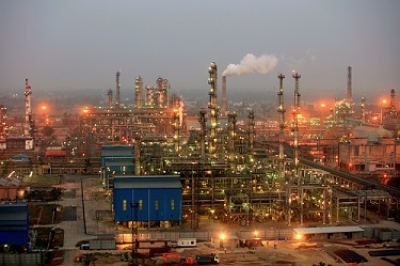New Delhi– The ongoing conflict in the Middle East, has caused only negligible disruption in India’s trade so far but has driven up prices of gold and crude oil.
Their trajectories will bear watching, especially crude oil, given India’s high dependence on its import. Also, elevated crude oil prices have a cascading impact on a host of other sectors that consume the oil itself or linked raw materials, according to a CRISIL report released on Tuesday.
Since the Middle East conflict began in early October, gold prices have surged 13-15 per cent to over Rs 60,000 per 10 gm. Further sharp increases would materially dent affordability and growth of gold jewellery retailers. Their inventory related borrowings could then rise, which can have some bearing on debt metrics, the report says.
Any spillover of the conflict to nearby oil producing and exporting regions could result in supply-related constraints and spiralling prices of crude oil. Within a week of the conflict, crude oil prices rose around 4 per cent to $90 per barrel but have stabilised a tad lower thereafter.
A sharp rise in crude oil prices will impact linked sectors in India, such as aviation, automotives, paints, tyres, cement, chemicals, synthetic textiles and flexible packaging. Besides, higher inflation may lead to interest rates continuing to rule firm in India till the conflict de-escalates.
India’s trade with Israel is relatively low, accounting for 1.9 per cent of total exports and 0.3 per cent of total imports last fiscal. The merchandise exports mainly comprise polished diamonds and petroleum products, including refined hydrocarbons, while imports largely comprise industrial equipment, fertilisers, rough diamonds, and precious stones.
For domestic diamond polishers, Israel is primarily a trading hub. Exports to the country were around 5 per cent of total diamond exports from India last fiscal. Additionally, around 2 per cent of all roughs imported are from Israel. Polishers also have alternative trading hubs, such as Belgium and the United Arab Emirates, with ultimate customers based in the US and Europe.
Israel is a major global producer of muriate of potash (MoP) and among the top three countries that India imports from, accounting for around 25 per cent of all MoP imports last fiscal. However, the share of MoP (as final product or as an ingredient in other fertilisers) remains low at around 10 per cent of domestic fertiliser consumption. Additionally, India’s ability to source from other countries lowers the supply risk.
While the overall impact on India remains low as of now, any spread of the conflict leading to disruption of operations at major ports can have some impact, the report added. (IANS)







